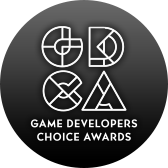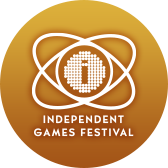The inaugural year for the Independent Games Festival (IGF) was over a decade ago. While over 1,000 entries exist for the 2014 competition, IGF was 10 times smaller in 1999, which may correlate to a time when it was more difficult to be financially successful and independent. Indie angel investors and incubators, console support, digital distribution channels, easy access to free tools and assistance, and online crowd funding initiatives were all but missing at the turn of the millenium.
Even if IGF recognized these innovative but incomplete games, there were more obstacles and fewer options for them to make it to retail. It should come as no surprise that some of the IGF 1999 games from smaller studios remain unfinished. Though not all the games earned success, the talent behind these games has persevered.
Master of remastering ceremonies Jason Scott has revisited some of the more widely known game talent from that year. To complement Jason's excellent preservation of the finalist show reel, this piece will explore what has happened to as many of the first IGF finalists as possible. It looks at what IGF has done for these sometimes repeat finalists, what else they have worked on, and even what they feel could improve IGF.
Singularity Software's Fire and Darkness
Fire and Darkness earned the grand prize and audience choice in 1999. However, it was never completed. David Rosenthal of then Singularity Software said the project is "sitting on a hard disk taking up bits." He's thought about porting it as a multiplayer 3D RTS for a tablet. With a smile, David asked if anyone knows an indie developer who wants to resurrect some award-winning code.
Rosenthal has since started various companies and now works at FoudationDB, building a next-generation distributed database. He's not working on games, but the companies he's started have been with his IGF teammate, Dave Scherer. David stated, "Winning the first IGF was a fantastic experience for us and quite a surprise. When people hear that you have worked on games, they know how challenging that is, and it becomes a great credential."
David feels "IGF rewards exceptional efforts in single aspects of game design... [and] is where the indies can really push things forward by taking risks that the big studios cannot." However, he's not sure what an "indie" game is now. "Maybe we should create some 'awesome for the effort' awards that take development time into account? At the first IGF, the industry was walled off by publishers, and the distinction seemed clearer than it is now."
Vicarious Visions's Terminus
Sande Chen was a writer and narrative consultant on Terminus. She went on to be nominated for the first Writers Guild of America Award in Videogame Writing for the PC game, The Witcher.
She recalls Terminus was a very ambitious game. "I remember it was released for Mac, Windows, and Linux. The package had three CDs (one just for the music) and it was a huge world, in terms of visuals and narrative. Terminus was a meld of RPG and space combat."
Terminus was her first entry in game development and first attempt at branching narrative. "Still, because I knew all the endings, I could suggest missions to provide foreshadowing of events to come. There were several characters to develop in different factions. I'm glad that I had the experience of working on a big, expansive game early on. It's my breaking-in story; Terminus is the game that launched my career in video games."
She says she has seen the IGF evolve over the years. "IGF and the indie game scene has always been one of my favorite parts of GDC. I am really honored to have been there at the IGF during its first year.
"I think that in the beginning, I was not quite sure how 'indie' the IGF would be. Did 'indie' simply mean that the devs had no publishing deal? Was the team 'indie' if it had 100 workers and was privately funded by a big conglomerate? After the casual game explosion and now with digital distribution, Kickstarter, and a market for smaller, non-console games, it's now even more possible to develop games without following the traditional developer/publisher track. The opportunities are rich for expressive, cutting-edge, and personal games."
She says the IGF's Excellence in Narrative addition couples well these types of games. "Indies have the opportunity to tackle topics that wouldn't be covered in blockbuster, mainstream titles. As a game writer and gamer, I look forward to hearing these stories and unique [points of view]."
Human Soft's Seed
Human Soft's Gabor Kadas said that the team worked on finalist Seed after the first IGF but never found a publisher for it. Being "foolish to finance it further," they abandoned it.
Gabor stated most of Human Soft's members still work in the game industry and are generally focused on social gaming. Human Soft develops for PS3, PS4, 3DS, PS Vita, as well as iOS and Android, and is making original IP based on extreme sports which currently needs a publisher.
Over the past decade, Human Soft has worked on games with several well-known companies and properties: Disney, Barbie, Pac-Man, and the GameBoy Advance and Nintendo DS versions of Tomb Raider: Legend.
Gabor told me he thought it would be nice if IGF were able to guarantee a publishing deal for the finalists. Fortunately, starting with IGF 2013, Valve has offered just that for all finalists, along with the multi-year XBLA Prize that began with IGF 2012.
Nothing Special Productions' V.D.
Developer Everett Bell said V.D. never made it past a demo with three playable levels. His team changed the name and spent some time updating the game engine, but they eventually took a break from the time-consuming strategy RPG title and switched to creating casual games. Demos of V.D. and its successor, Torune, were included in Ernest Pazera's Isometric Game Programming with DirectX in 2001.
Everett's company has dropped the name Nothing Special Productions and began development of multiple casual puzzle games as NSPGames. Its latest game, MatchBlox 2: Abram's Quest was published and distributed by Oberon Media in 2009.
As a new project, he's working on software that allows users to paint with sound. He explains, "[The] brush position is controlled with a webcam and a light source, other properties are controlled with an audio input. Notes map to colors, so an A could be red, B blue, etc. The louder the note, the larger the brush stroke."
Everett's experience at the first IGF "was definitely one of the most influential events of my career. Nothing else has come close to bringing the amount of industry exposure we received before, during and after the conference. Three full days of showcasing the game we'd worked on in relative secrecy for months to publishers, the press, and other development studios was amazing. From the overwhelming feedback and interest in what we'd invested so much to being interviewed by Leisure Suit Al Lowe himself, 'unbelievable' doesn't even begin to describe it."
Everett's day job is VP and senior software developer for SynTel, LLC, a growing company specializing in customer communications. His partner Chris is working as a tattoo artist while finishing up a degree in graphic arts. "Although our efforts are no longer focused on game development full time, we still look back on the IGF as the launch pad for what we've become today."
Everett believes "the focus should always be on showcasing game developers that operate with zero outside influence, financial or otherwise. The IGF has generally kept that original premise since the beginning. Success doesn't keep someone from being independent. In fact, that success shows just how innovative and well-received a self-driven group of artists can be."
CogniToy's MindRover
Kent Quirk of CogniToy was fortunate to create a title that shipped; MindRover sold about 20,000 copies. "Retail was tough for an indie like us, and we lost a fair amount of money trying to do it, in part due to plain bad luck." They later adapted MindRover under contract for a government agency to be used as a special-purpose training simulation for a military university, which made enough money to break even. He began working on a version of MindRover for the iPad but had to shelve it when he got a new job.
After marketing MindRover for a couple of years, CogniToy developed games in the mobile and serious games spaces, and then shut down its business when a contract turned into job offers for the whole team. Since then, Kent's been working in the electronic entertainment industry (including Playdom) until just this year. In July, he took the opportunity to lead the engineering team for Tidepool, which is building open source software to help manage Type 1 diabetes.
Regarding the IGF, Kent wondered, "Some people think it should not include games that are already 'successful,' but how do you measure that?" Participating in the first IGF was frustrating for him, since the winning team didn't have a playable demo, something he worked hard to have for the competition. "It was a gorgeous demo, but there was no gameplay at all. It felt like they won because they were college kids and a good story."
Unlike the rest here, Kent felt the IGF has mostly been good resume fodder. "It didn't change my life or the success of MindRover very much, but it's still fun to talk about. We did get one contract gig from someone we met at the IGF, but that was just a matter of luck."
However, he was happy to have met the late Seumas McNally. Kent spent quite a bit of time over the next year chatting with Seumas while he worked to finish his game, Tread Marks, which won the IGF only a couple of days before he passed away. The IGF grand prize is now named after Seumas.

Morphonix's Journey into the Brain
Karen Littman of Morphonix was another success story: Journey into the Brain has won many awards and was picked up by many distributors. "To date, it is our best selling product," Karen said. "Being an IGF finalist has helped give us credibility in the game community."
Morphonix has since continued the series it began with Journey into the Brain. The other award-winning games in the series are Neuromatrix and Every Body Has a Brain. Littman shares that this series introduces children and teens to the workings of the brain in a fun and engaging way.
Most recently, Morphonix released Hiding Hippos - Brain Game for Kids, the first in Morphonix's forthcoming suite of NeuroPlay Adventures: mobile apps for tablets and smart phones for kids ages 5-8.
Karen feels that with so many kids playing games from a young age, she'd like to see more games like Journey into the Brain on the finalist list.
Keith Nemitz's Flagship: Champion
Keith Nemitz's still tells himself FlagShip: Champion is on the back-burner. "I would love to take my starship combat game to completion." He feels it is as innovative today as it was then. Tools and techniques have become amazingly efficient to make its production much cheaper, but he feels it's still not financially feasible.
Another title of Keith's, The Witch's Yarn, was a 2006 IGF Finalist. At his company, Mousechief, he had been working on a new casual strategy game for two years: 7 Grand Steps, which became an 2013 IGF finalist. The idea is to guide a family legend through the ages. It's a multi-generational drama that will cover the history of civilization akin to an "Oregon Trail of humanity," he described.
Keith thinks that IGF is great for self evaluation, as it motivates him to improve. However, he is worried his Dangerous High School Girls in Trouble! game did not make it because (at that time) there was no category for what makes it great: the writing. "IGF had awards for audio, graphics, and game play, but writing was as much of an orphan of the indie scene as it is in the game industry at large. With the 2013 addition of the Narrative award, this becomes less problematic. However it means there are now two awards for audio, graphics, and gameplay, while there is only one for writing. Consider that narrative can be heavily influenced by audio, graphics, and gameplay. The nomination of the wonderful but unwritten narrative, Thirty Flights of Loving, underscores the point."
Reflecting on his 2013 nomination in the Nuovo category, for 7 Grand Steps, "I was surprised by the category. I thought its writing was stronger than the gameplay was unique. Still, 7 Grand Steps did achieve an Honorable Mention for the Narrative category. Standing in the IGF pavillion was very emotional. I felt more proud than before. I was certainly more organized, as evidenced in the photo [below]." "I was surrounded by radically different titles such as Spaceteam, Little Inferno, Dys4ia, and Cart Life, and then suddenly Howling Dogs! I realized that indie games and the community have reached a new plateau. Considering my age compared to the other devs, I was incredibly pleased that we socialized enthusiastically. A terrific example of game development bringing diverse people together. In my case, Nuovo meant, 'new life.'"
"I was surrounded by radically different titles such as Spaceteam, Little Inferno, Dys4ia, and Cart Life, and then suddenly Howling Dogs! I realized that indie games and the community have reached a new plateau. Considering my age compared to the other devs, I was incredibly pleased that we socialized enthusiastically. A terrific example of game development bringing diverse people together. In my case, Nuovo meant, 'new life.'"
Finally, Keith doesn't overstate the facts in how life-altering IGF has been for him. "The only thing it hasn't done is kept my hair from falling out."
[IGF 1999 photos provided by David Rosenthal]


